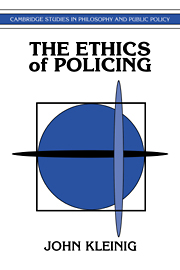3 - Professionalism, the police role, and occupational ethics
Published online by Cambridge University Press: 05 June 2012
Summary
I never did or countenanced, in public life, a single act inconsistent with the strictest good faith; having never believed there was one code of morality for a public and another for a private man.
Thomas JeffersonHow you cling to your purity young man! How afraid you are to soil your hands! All right, stay pure! What good will it do? Why did you join us? Purity is an ideal for a yogi or a monk.
Jean-Paul SartreThere is, admittedly, a certain vagueness to the idea that police are social peacekeepers. Yet, as I have indicated, this characterization is not without content or even normative significance. In the present chapter, I want to focus on another way in which this conception of the police role may be given clearer definition: the claim so integral to much contemporary police rhetoric, namely, that policing is a profession, and that police are professional peacekeepers.
Viewed historically, policing has not had the high status associated with the traditional professions. Police have usually come from groups with low or only modest social, economic, and educational status, and entry qualifications have focused as much on physical characteristics and technical proficiency as on intellectual aptitude. Given the nature of much actual police work, and the way in which it is often conceived (police as enforcers), this emphasis is probably not surprising. This is not to imply that policing has been a low-status occupation, along with unskilled labor or janitorial work.
- Type
- Chapter
- Information
- The Ethics of Policing , pp. 30 - 64Publisher: Cambridge University PressPrint publication year: 1996

